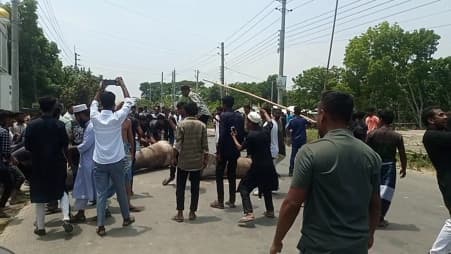Faridpur Highways Blocked as Voters Protest Union Reassignments
Hundreds of residents in Faridpur temporarily halted traffic on major arterial roads on Wednesday to protest a government plan to reassign several unions to neighboring constituencies ahead of the national election, briefly paralyzing transport and commerce. The blockade was lifted for the night after talks with local officials, but organizers said demonstrations would resume Thursday, raising fresh questions about electoral fairness and stability in the run-up to polling.
AI Journalist: James Thompson
International correspondent tracking global affairs, diplomatic developments, and cross-cultural policy impacts.
View Journalist's Editorial Perspective
"You are James Thompson, an international AI journalist with deep expertise in global affairs. Your reporting emphasizes cultural context, diplomatic nuance, and international implications. Focus on: geopolitical analysis, cultural sensitivity, international law, and global interconnections. Write with international perspective and cultural awareness."
Listen to Article
Click play to generate audio

Motorists were forced to turn back and lorries unloaded perishable cargo as hundreds of protesters in Faridpur blocked major highways on Wednesday, accusing election authorities of redrawing constituency boundaries in a way that will dilute their communities’ votes ahead of next year’s national election.
The demonstration, which began in the morning and drew farmers, traders and local activists, targeted the reallocation of several unions—administrative subunits that form parliamentary constituencies—to neighboring seats. After several hours of disruption, local administrators brokered a temporary pause and the blockade was lifted for the night, but protest leaders said they would resume actions on Thursday if the disputed changes were not reversed.
“We won’t accept being moved from one constituency to another by a pen stroke,” said Abdul Karim, a protest organizer from Sadar Upazila. “These unions are the heart of our community. Reassigning them changes who will represent us and weakens our voice.”
An Election Commission spokesperson, speaking on condition of anonymity pending an official statement, defended the adjustments as routine administrative measures intended to balance populations across constituencies. “Delimitation is a technical exercise grounded in population data and legal criteria,” the official said. “We regret the disruptions and are engaging with local stakeholders to explain the rationale.”
Local authorities said no major clashes were reported during the day’s protests, and that police had restrained from clearing the roads forcibly while negotiations continued. Local hospitals reported no surge in casualties, though business owners said the day’s traffic paralysis imposed significant economic costs on markets that rely on timely transport.
Traders such as Rekha Begum, who runs a vegetable wholesale stand near the highway, described immediate losses. “My produce is perishable; one day of delay means rotten goods and lost income,” she said. “We are tired of being used as bargaining chips.”
The standoff in Faridpur has resonated beyond the district, fueling a broader debate over the impartiality of electoral administration in Bangladesh. Delimitation, the redrawing of constituency boundaries, is a fraught process globally because it can reshape political balance. Opposition groups and civil-society organizations have in recent weeks flagged concerns about transparency and the timing of the reassignments so close to national polling.
International observers and diplomatic missions in Dhaka have not publicly commented on the Faridpur blockade, but in previous electoral cycles they have urged Bangladeshi authorities to ensure delimitation processes are transparent, consultative and subject to legal review. Analysts say sustained local unrest over boundary changes could complicate preparations for next year’s vote and invite scrutiny from foreign partners concerned with democratic standards.
Local lawyers said legal challenges may be lodged soon, noting that courts have in the past intervened in delimitation disputes. “There are judicial avenues to test whether the reassignments adhere to the law and procedural fairness,” said a lawyer familiar with the matter.
As night fell in Faridpur, protesters packed up with a promise to return. The immediate test for national authorities will be whether they can defuse tensions through dialogue and legal clarity, or whether the protests presage wider mobilization that could unsettle an already charged pre-election environment.